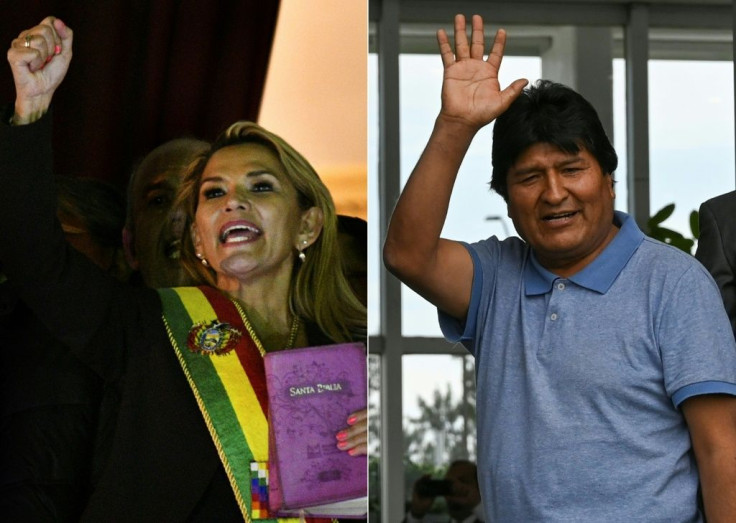Bolivia Crisis: Can Second-Tier Opposition Politician Jeanine Áñez Quell Political Protests As Election Results Questioned?

Second-tier opposition figure Sen. Jeanine Áñez has seized the reins in Bolivia as fresh waves of protests engulf the South American nation despite promised elections in the wake of Evo Morales' resignation and flight to Mexico.
Áñez, with the support of the Constitutional Court, has promised to hold elections within 90 days.
Morales, who resigned in the wake of a disputed election in October, said he does not recognize the legitimacy of Áñez, Agence France-Presse reported, and has called for "national dialogue" to end the imbroglio. Morales tweeted that her usurpation amounted to a “coup.”
Áñez, 52, claimed leadership of the government after the vice-president and other party leaders resigned en masse – citing that as deputy senate leader she was next in line under provisions of the constitution.
Áñez has been a vociferous critic of Morales. Lawmakers appointed her as president but the session was boycotted by members of the ex-president’s leftist Movement for Socialism party. Of great concern to Áñez is that Morales’ party still holds a majority of seats in the Plurinational Legislative Assembly.
At the crux of the current conflagration is last month’s election – where Morales, Bolivia’s first indigenous president, ran for an unprecedented fourth term. While Morales apparently won the first round, questions about the legitimacy of the result were raised by opposition parties within Bolivia and the Organization of American States, which called for an annulment of the tally and a new election.
The dispute led to weeks of violent protests and eventually Morales’ departure – reportedly at the behest of Gen. Williams Kaliman, the armed forces chief.
Now, as the country faces serious uncertainties, the U.S. State Department has advised U.S.-government employees to flee Bolivia.
President Donald Trump hailed the resignation of Morales as “a significant moment for democracy in the Western Hemisphere,” saying Morales’ fourth term overrode the “the Bolivian constitution and the will of the people.” Trump added that Morales’ exit “preserves democracy.”
Meanwhile, OAS is demanding the La Paz government observe “the rule of law” and run a fair, new election.
However, the Center for Economic and Policy Research, a Washington think tank, rejected the notion that Morales’ victory was fraudulent.
“There is simply no statistical or evidentiary basis to dispute the vote count results showing that Evo Morales won in the first round,” senior policy analyst Guillaume Long said in a statement.
Mark Weisbrot, co-director of the center, criticized OAS for questioning Morales’ triumph without any evidence.
“The OAS press statement of Oct. 21 and its preliminary report on the Bolivian elections raise disturbing questions about the organization’s commitment to impartial, professional, electoral observation,” he said.
Global Affairs Canada, a Canadian government agency, said since Morales took power in 2006 and enacted economic and social reforms. Bolivia has reduced extreme poverty levels from 38% in 2005 to 17% in 2017.
“Still, Bolivia has one of the highest levels of extreme poverty in Latin America and the rate of poverty reduction has stagnated over the last few years,” GAC stated.
Moreover, Morales’ own ethnic group, indigenous people, who account for about two-thirds of the populace, remain mired in poverty. The Government of Bolivia, GAC added, has commenced a development plan designed to eliminate extreme poverty by 2025.
© Copyright IBTimes 2025. All rights reserved.





















